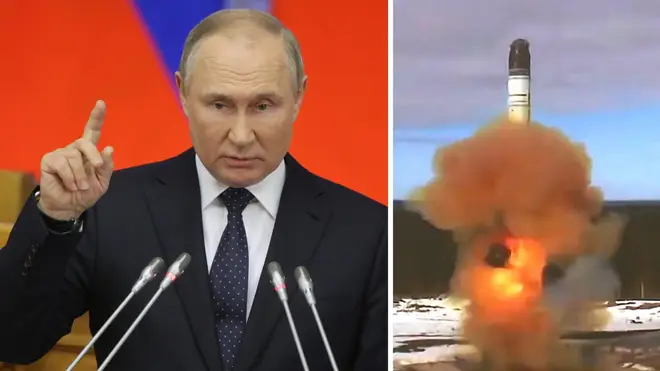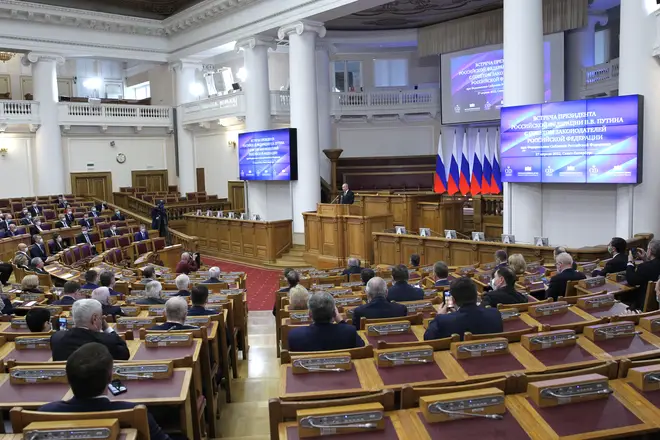
Nick Abbot 10pm - 1am
27 April 2022, 16:10 | Updated: 27 April 2022, 17:06

Vladimir Putin has stepped up threats of nuclear strikes against countries that ‘interfere’ with Russia’s invasion of Ukraine.
The Russian President issued a chilling warning to legislators in a speech in St Petersburg threatening ‘lightning fast’ retaliatory strikes.
“If someone from the outside tries to intervene in Ukraine then our response will be lightning fast,” he said.“We have all the weapons we need for this,” he said.
“No one else can brag about weapons, and we won’t brag about them. But we will use them.”
Read more: Russia threatens to strike against Britain over its support for Ukraine
His comments are understood to be a reference to the Sarmat or “Satan 2” missile that can carry a nuclear warhead at speeds of up to 16,000mph.
Putin’s defiant speech ignored the heavy Russian losses in Ukraine instead promising lawmakers that “all objectives will definitely be carried out.”

Minister says Ukraine is attacking Russian supply lines
He said the West had been trying to back Russia into a corner and then imposing heavy sanctions when Russia resisted.
Putin also claimed in his speech that the West wanted to cut Russia up into different pieces and accused it of pushing Ukraine into conflict with Russia.
He also claimed the rouble, Russia's banking system, transport sector and economy as a whole have withstood sanctions imposed on Moscow. He also promised a response to attempts to isolate Russia.

But Russia's economy ministry expects the country's gross domestic product to shrink by 8.8 per cent in 2022 in its base case scenario, or by 12.4 per cent under a more conservative scenario, according to Reuters.
In a chilling warning earlier today pro-Putin TV anchor Vladimir Solovyov threatened to strike Britain.
"As it turned out, one Sarmat means minus one Great Britain," he said.

Ukraine: Andrew Marr hears from General Sir Richard Shirreff
Russia has warned it may halt natural gas supplies to other European Union customers after cutting off gas supplies to Poland and Bulgaria.
The move represents a dramatic escalation of the conflict that is increasingly becoming a wider battle with the West.
One day after the United States and other western allies vowed to speed more and better military supplies to Ukraine, the Kremlin upped the ante, using its most essential export as leverage.
It then went even further, saying Russia could halt gas supplies to other European customers.
European gas prices shot up on the news that Poland and Bulgaria were cut off, a move that European leaders denounced as "blackmail".
In a memo, state-controlled Russian giant Gazprom said it was cutting Poland and Bulgaria off from its natural gas because they refused to pay in Russian roubles, as President Vladimir Putin had demanded.
The company said it had not received any such payment since the beginning of the month.
The gas cuts do not immediately put the countries into dire trouble since they have worked on getting alternative sources for several years now and the continent is heading into summer, making gas not as essential for households.
Still, it sent shivers of worry through the 27-nation European Union, which immediately convened a special co-ordination group to limit the impact of the move.
And Kremlin spokesman Dmitry Peskov's ensuing warning was sure to worry them even more.
He told reporters that other European customers may be cut off if they also refuse to pay in roubles.
The Russian military claimed on Wednesday that its missiles hit a batch of weapons that the US and European nations delivered to Ukraine.
A day earlier, explosions rocked the separatist region of Trans-Dniester in neighbouring Moldova, knocking out two powerful radio antennas and raising fears the war could spill over Ukraine's borders.
No-one claimed responsibility for the attacks - the second in as many days - but Ukraine all but blamed Russia.
And a Russian missile hit a strategic rail bridge linking Ukraine's Odesa port region to neighbouring Romania, a Nato member, Ukrainian authorities said.
Just across the border in Russia, an ammunition depot in the Belgorod region was burning early on Wednesday after several explosions were heard, governor Vyacheslav Gladkov said on the messaging app Telegram.
Gazprom's decision to cut gas to two European countries was another dark turn in the war, which has revived the geopolitical rifts of the Cold War, and it had an immediate impact.
European gas prices spiked 25%, with benchmark Dutch futures jumping from around 100 euros per megawatt hour to around 125 euros.
Fatih Birol, executive director of the Paris-based International Energy Agency, called the move a "weaponisation of energy supplies" in a tweet.
"Gazprom's move to completely shut off gas supplies to Poland is yet another sign of Russia's politicization of existing agreements & will only accelerate European efforts to move away from Russian energy supplies," he wrote.
EU Commission president Ursula von der Leyen called the move "yet another attempt by Russia to use gas as an instrument of blackmail".
Bulgarian Prime Minister Kiril Petkov also called the suspension of gas deliveries blackmail and said it was "a gross violation of their contract".
"We will not succumb to such a racket," he added.
The stoppage marked "an historical turning point in the bilateral energy relationship" between Russia and Europe, said Simone Tagliapietra, senior fellow at the Bruegel think tank in Brussels.
On Tuesday, the US defence chief urged Ukraine's allies to "move at the speed of war" to get more and heavier weapons to Kyiv as Russian forces rained fire on eastern and southern Ukraine.
Poland, a historical rival of Russia, has been a major gateway for the delivery of weapons to Ukraine and confirmed this week that it is sending the country tanks.
The Kremlin has been angered by armed forces minister James Heappey who said it was "completely legitimate" for Ukraine to strike strategic targets on Russian soil.
Russia's defence ministry accused the UK of "direct provoking" Ukraine into attacks, warning of a "proportional response" if the country succeeds in landing them, hinting at possible strikes at British sites in Kyiv.
Deputy PM Dominic Raab said today: "The Russian statement is unlawful and what we're doing is lawful, we're entitled, all states are entitled to provide military support to any state exercising the right of lawful defence against an aggressive invasion.
"Frankly if Russia starts threatening other countries it only adds further to their pariah status and will only further the solidarity and consensus in the international community that they must be stopped."
Mr Heappey had argued it was "not necessarily a problem" even if Ukrainians used British-donated weapons to strike Russia in its own territory "to disrupt the logistics that if they weren't disrupted would directly contribute to death and carnage on Ukrainian soil".
According to the Interfax news agency, the Russian defence ministry said: "We would like to stress that the direct provoking by London of the Kyiv regime into such activities, should there be an attempt to realise them, will immediately lead to our proportional response."
A statement reportedly added that Russian forces were primed to "deliver retaliatory strikes using long-range high-accuracy weaponry" against "centres taking relevant decisions" in the Ukrainian capital Kyiv.
"The advisers from among the subjects of one of the Western countries that are located in Ukrainian decision-making centres in Kyiv will not necessarily be a problem when Russia decides to take retaliatory action," the ministry said.